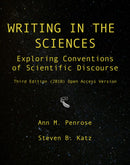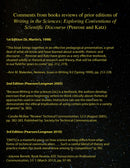Ann M. Penrose and Steven B. Katz
Third Edition (2010), Open Access Version
Information and Pricing
978-1-64317-186-9 (PDF, free download) © 2020 by Ann M. Penrose and Steven B. Katz. 326 pages with illustrations, notes, bibliography, index, activities, and assignments. Published under the Creative Commons license, “Attribution-NonCommercial-ShareAlike 4.0 International (CC BY-NC-SA 4.0 ),” subject to the standard conditions.
Bookstores: Order by fax, mail, or phone. See our "Sales and Ordering Page" for details.
What People Are Saying
About the 3rd edition:
“[WiTS] is a masterful piece on how science writing differs from other forms of technical communication. . . . Such a careful blend of theory and practice makes this book stand alone among its competitors” (p. 99). —Jolynne Berrett, Book Review, IEEE Transactions on Professional Communication, 55: 1 (March 2012), pp. 97-99.
About this open access edition on social media:
“I ❤ the book so much. It is foundational to how I’ve taught science writing for almost 16 years. Now it informs the faculty development workshops I lead for STEM faculty. I’m always recommending it.” —T. Kenny Fountain, University of Virginia.
[WiTS] is a rock solid book, unique in its genre.” —David Kellogg, Coastal Carolina University
“Congratulations, Steve and Nancy! I’m so excited and always recommend your book as the best book on the subject.” —Ashley Rose Mehlenbacher, University of Waterloo
“This is such great news. Having this open access is going to help so many students—even just at NC State ❤️❤️” —Stacey Pigg, North Carolina State University
“CCNY’s campus has been using your textbook for a while and has grants available for instructors who provide zero textbook cost/OER courses. This will benefit our students so much! I can’t wait to spread the news! Thanks for sharing!” —Julia Rose Brown, The City College of New York
“What a wonderful gift to our community!” —James Dubinsky, Virginia Tech
About This Book
Writing in the Sciences: Exploring Conventions of Scientific Discourse is an advanced science writing textbook grounded in the rhetoric of science, the sociology and history of science, and linguistics. The book treats the major genres of writing in science and research: scientific research reports, grant proposals, conference papers and other professional presentations, and public communication, as well as the social, rhetorical, and ethical bases of these as scientific arguments. Focusing not only on the distinctive features of these genres but also on how and why such texts are created by scientists, the book thus highlights the multiple genres of science writing as distinguished from technical writing and other professional writing domains.
In keeping with the goal of treating genres as they are used in various disciplines, the authors approach the task of teaching students in the sciences how to write in their chosen field in a descriptive rather than a prescriptive way. That is, rather than listing a generic set of prescriptive rules, the authors present general rhetorical concepts and heuristics that students can use to recognize and analyze the conventions actually used by scientists in their own fields, and to use these conventions effectively in their own writing. Examples are drawn from a range of scientific disciplines, enabling students to recognize and place their own field's practices in the context of those of other disciplines. Such comparisons also provide the opportunity for instructors and students to identify common conventions in science, investigate variation across fields, and recognize relationships between the structure of a discipline's inquiry and the logic of its spoken, written, graphic, and digital texts.
About the Authors

Ann M. Penrose is Professor Emerita of English at North Carolina State University, where she also served, most recently, as Director of Graduate Studies in English. The present work instantiates a career of teaching and studying scientific discourse with undergraduates, graduate students and faculty in the research sciences. Dr. Penrose’s research on writing development, composition pedagogy and professional identity has appeared in Written Communication, College Composition and Communication, Writing Program Administration, Research in the Teaching of English, and other venues.
 Steven B. Katz is Pearce Professor Emeritus of Professional Communication, and Professor Emeritus of English, at Clemson University. He was also a Fellow of the Rutland Institute for Ethics at Clemson, and from 2014-2018 organized the WID Initiative. Dr. Katz is the author of The Epistemic Music of Rhetoric, and many publications in collections and journals. “The Ethic of Expediency: Classical Rhetoric, Technology, and the Holocaust” received the 1993 NCTE Award for Excellence in the Category of Best Article on the Philosophy or Theory of Technical and Scientific, and has been reprinted and widely cited.
Steven B. Katz is Pearce Professor Emeritus of Professional Communication, and Professor Emeritus of English, at Clemson University. He was also a Fellow of the Rutland Institute for Ethics at Clemson, and from 2014-2018 organized the WID Initiative. Dr. Katz is the author of The Epistemic Music of Rhetoric, and many publications in collections and journals. “The Ethic of Expediency: Classical Rhetoric, Technology, and the Holocaust” received the 1993 NCTE Award for Excellence in the Category of Best Article on the Philosophy or Theory of Technical and Scientific, and has been reprinted and widely cited.







